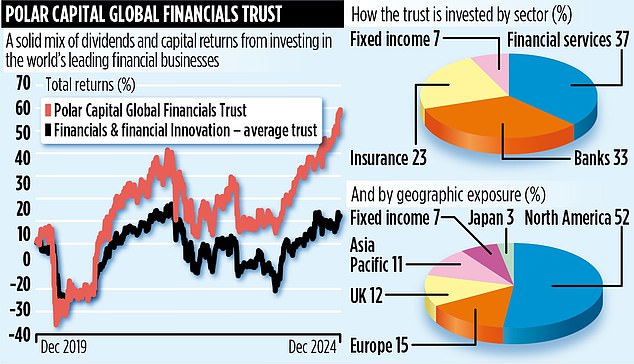Investment trust Polar Capital Global Financials offers investors the chance to make money from some of the world’s leading financial brands – such as JPMorgan, Mastercard, Visa and Warren Buffett’s Berkshire Hathaway.
Though a specialist fund that should form only a small slice of a diverse investment portfolio, its appeal is obvious. With more than half of its assets in the US, it provides an alternative avenue into the country’s booming stock market.
Its financial focus means it does not hold any of the so-called ‘magnificent seven’ US growth stocks – Alphabet, Amazon, Apple, Meta, Microsoft, Nvidia and Tesla – which have been largely responsible for driving the US equity market ever higher.
According to the fund’s managers, the relative valuations of many US financial stocks remain compelling compared to the wider US stock market, despite a recent rally. In other words, they are relatively cheap and have the potential to ratchet up in price.
Also, the investment team at Global Financials believes incoming US President Donald Trump will help create an economic and fiscal backdrop conducive to financial-orientated businesses (banks, consumer finance providers and alternative asset managers) doing well. Lower business taxes, falling interest rates, lighter-touch regulation of the banks, modest inflation and an economy that steers clear of recession should all mean bigger revenues and profits for financial companies.
The trust, with a market capitalisation of just below £600 million, has more than half of its assets in the United States. It is run by a triumvirate of managers – Nick Brind, George Barrow and Tom Dorner – brimming with experience of running financial funds.

Brind says: ‘Stocks in the United States are definitely in a sweet spot. It now looks as if the US economy will have a soft landing. If that’s the case, and all the other parts of the Trump financial and economic jigsaw come together, it bodes well for financials.’
The UK stock market-listed trust has 60 equity holdings plus a small exposure to fixed income stocks (7 per cent) and two stakes in UK unquoted businesses, Atom Bank and Moneybox.
The financial stocks are not homogeneous. Though the US bias dominates, the trust has a healthy collection of banks both in the UK (the likes of Barclays and NatWest) and Europe (Bank of Cyprus, Austrian bank Erste Group and the acquisitive Italian-based UniCredit). Among its top 10 holdings is Indian bank ICICI.

This diversity is complemented by key positions in different parts of the financial sector. Alternative asset managers – such as US-based Ares Management (involved in private equity, credit, and real estate markets) – and payments companies are micro sectors that Brind and his team are positive on.
The trust’s recent performance numbers are strong. Over the past year, it has generated a total return of 46 per cent – ahead of the average for its financials and financial innovation peer group (28 per cent).
Yet, it has not always been plain sailing. The trust suffered acutely when the pandemic brought the world economy to a near halt in early 2020. Its size also shrank as a result of a scheme allowing investors to sell their shareholdings at close to the trust’s asset value.
A similar process will take place next June, though investor appetite is unlikely to be as voracious given that the trust’s performance numbers look better and the shares are trading at only a 4 per cent discount.
The trust pays a dividend equivalent to 2.3 per cent a year and the annual charges total 0.84 per cent (source: Hargreaves Lansdown). The stock market identification code is B9XQT11 and the ticker is PCFT.
DIY INVESTING PLATFORMS

AJ Bell

AJ Bell
Easy investing and ready-made portfolios

Hargreaves Lansdown

Hargreaves Lansdown
Free fund dealing and investment ideas

interactive investor

interactive investor
Flat-fee investing from £4.99 per month

Saxo

Saxo
Get £200 back in trading fees
Trading 212
Trading 212
Free dealing and no account fee
Affiliate links: If you take out a product This is Money may earn a commission. These deals are chosen by our editorial team, as we think they are worth highlighting. This does not affect our editorial independence.
This article was originally published by a www.dailymail.co.uk . Read the Original article here. .


